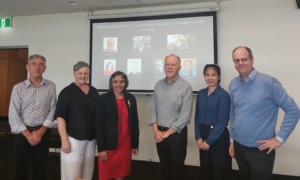 On Thursday, February 9th, a group of Griffith Researchers also associated with Adult Learning Australia, presented their research in a hybrid seminar called Supporting, guiding and enacting learning across working life . Led by Professor Stephen Billett, the project director, the group includes Professor Sarojni Choy, Dr Raymond Smith, Dr Anh Hai Le and Associate Professor Debbie Bargallie from Griffith. International participants include Professor Henning Salling Olesen of Roskilde University and Professor Laurent Filliettaz from the University of Geneva. This ARC-funded project aims to generate evidence-based policies and informed practices supporting work-life learning arrangements to promote Australian workers’ employability.
On Thursday, February 9th, a group of Griffith Researchers also associated with Adult Learning Australia, presented their research in a hybrid seminar called Supporting, guiding and enacting learning across working life . Led by Professor Stephen Billett, the project director, the group includes Professor Sarojni Choy, Dr Raymond Smith, Dr Anh Hai Le and Associate Professor Debbie Bargallie from Griffith. International participants include Professor Henning Salling Olesen of Roskilde University and Professor Laurent Filliettaz from the University of Geneva. This ARC-funded project aims to generate evidence-based policies and informed practices supporting work-life learning arrangements to promote Australian workers’ employability.
The investigation captured participants’ work-life learning histories, monitoring how work and learning co-occur in the current era. The perspectives of working-age Australians were considered, with a focus on how their employability needs could be guided and supported through personal learning and lifelong education provisions. This project included the worklife histories of over 50 informants many aged from 50 upwards and survey of over 600 working Australians– an enormous amount of data that gave the researchers some fascinating insights into the needs of learners across their work life span.
The project team proposes that while emphasis is placed on adults learning across their life span, especially for work-related purposes, the need for lifelong learning is now urgent given continuously changing conditions. Addressing these learning needs is translated into provisions of lifelong education (i.e., courses, programs). Although provisions play a significant role for many adults, they do not cover the heterogeneous needs of working-age adults. Moreover, most adult learning occurs outside the formalised educational provisions and taught courses, sector but through everyday activities and interaction within communities (OECD, 2013) and principally their workplaces.
Professor Stephen Billett opened the seminar by discussing the background, project aims and how the project was conducted. He raised fascinating ideas, some that may be overlooked. For example, the concept of “career” is understood differently by different individuals. “Career” might be seen as an umbrella term that includes issues such as people, experiences and community. Lifelong education involves more than only a job, he said.
Professor Billett mentioned that although most Australians wore masks at the commencement of the 2020 COVID-19 pandemic, there was just one company with four machines producing them, and one of the machines was not working. So, for Australia to become more self-reliant and sufficient there is a need to engage all working age Australians to have the capacities to realise those outcomes. Professor Billett explained that community was an important mediating source when discussing issues around life learning in adults. He was empathic in saying that “local level matters”. He added that “we need education infrastructure and systems that respond to the local level”.
During the presentation, the speakers shared some participants’ vignettes to illustrate key points. Professor Laurent Filliettaz provided two examples regarding literate practices in work-life histories. These stories described how two participants, Ingrid and Nathan, learned modern foreign languages to increase their job opportunities.
Associate Professor Debbie Bargallie explored how race impacted the personal experiences of Indigenous people at work. She talked to ten people who shared their life stories. These stories were analysed through the lens of critical race theory. She argued that to understand Indigenous People’s experiences, we need to see beyond the statistics and actually see people. Debbie’s presentation was compelling as it started with the different stereotypes that Indigenous People need to deal with daily in the Australian workplace and ended up saying Indigenous people need equal treatment by “making us count, not counting on us”.
Raymond Smith presented the transition trajectories people went through when they needed to change careers. Immigrants, refugees or relocated nationals seem to be forced to reinvent themselves. They change paths, careers, jobs and even communities, but their lifelong experiences need to continue as they need to support their families regardless of other activities.
Professor Sarojni Choy discussed the contributions of tertiary education in the field. She examined participants’ different experiences when changing careers and reinventing themselves. For example, Sofia started her work life as a retail worker; then began studying for a diploma in nursing to gain access to a nursing degree. Sofia’s learning path shows the great resilience and determination that adult learners must sometimes employ to reinvent themselves.
The life experiences and participants’ stories will be gathered, advanced and presented in a book about adult work-life learning for Springer in its Professional and Practice-based Learning series. This book will discuss the kinds of learning required to sustain employability across working life. The combinations of workplace experiences and educational provisions that supported and guided participants’ learning will be highlighted in the forthcoming book. The societal, workplace, educational, and personal practices that likely secured learning across participants’ working life will also be summarised. Whilst the contents of the book are yet to be finalised, we are certain it will be interesting, informative and of great help for further policy development.


